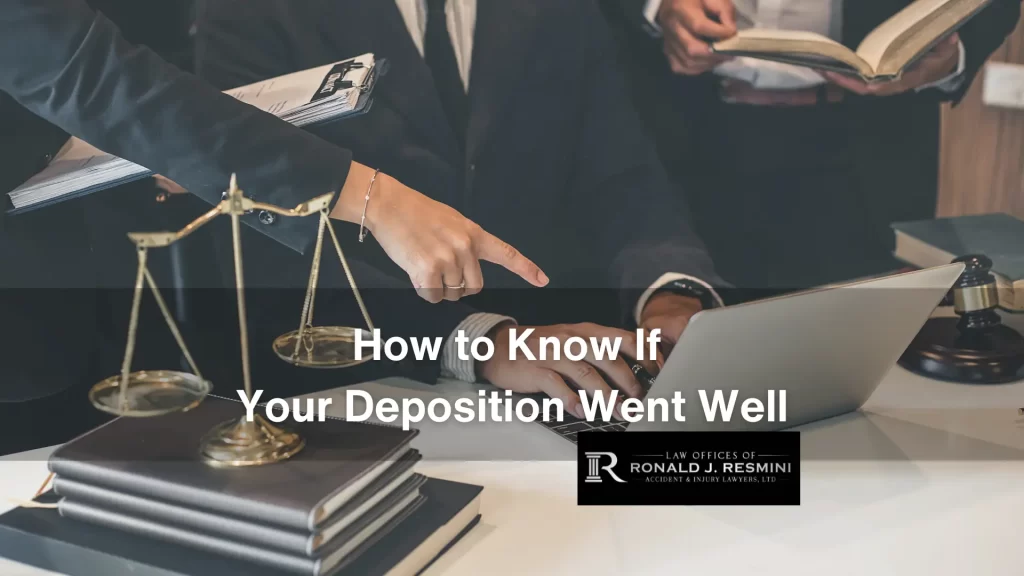You survived your deposition went well. Congratulations! Now that it’s over, you’re probably wondering if it went as well as it could have. Here are five signs your deposition went smoothly and you should feel good about your performance.
Your Deposition Went Well: You Stayed Calm and Composed

Credit: resminilawoffices.com
You stayed calm and composed. Losing your cool during a deposition is the worst thing you can do. It makes you seem unreliable and damages your credibility. No
matter how antagonistic the questioning becomes, remain polite and patient. Take deep breaths to stay calm. Don’t get aggressive or argue with the other party.
You listened carefully and thought before answering.
Pay close attention to the questions being asked so you understand them fully. Then, take a few seconds to think about your response before answering. Don’t just blurt out the first thing that comes to mind. Respond in a measured, deliberate way. If needed, ask for clarification to ensure you’re answering the right question. It’s better to pause for a few moments than to say something you may regret.
Your answers were concise and straightforward.
Keep your answers brief and avoid rambling. Respond directly to the question asked, without volunteering excess information. Don’t speculate or state opinions. Stick to facts within your direct knowledge. The less you say, the less there is to scrutinize and take out of context.
You admitted when you didn’t know something.
Don’t guess or make up answers if you’re unsure or lack direct knowledge about something. It’s perfectly fine to say “I don’t know” or “I’m not certain.” You can only testify to what you know personally. Admitting the limits of your knowledge upfront establishes your credibility as an honest witness.
You reviewed and verified the transcript.
Always review the full transcript of your deposition to verify its accuracy before signing it. Double check that your answers were recorded properly and clarify or correct anything that was missed or seems out of context. Your verified testimony is an official legal document, so you want to make sure it’s right.
You Were Clear and Concise in Your Answers

Credit: unionlawfirm.com
You knew exactly what to say and didn’t ramble or go off on tangents. When asked a question, you gave a concise yet complete answer without oversharing. This shows you were well prepared and focused, and didn’t get distracted or nervous.
- Your answers were clear and straightforward. You didn’t hedge or qualify your responses unless absolutely necessary. Speaking decisively and confidently in a deposition makes you seem more credible.
- You kept your answers at an appropriate length. You gave enough details and context for the question but didn’t drag on or repeat yourself. Keeping answers concise while still being thorough is key.
- You asked for clarification if a question was confusing or vague. Don’t be afraid to ask follow up questions to make sure you fully understand what’s being asked before responding. It’s better to ask for clarification than to give an inaccurate or incomplete answer.
- You avoided speculating or guessing. If you didn’t know the answer to something, you simply said so. Don’t make up information or speculate just to have an answer. Your credibility depends on providing truthful responses.
- You remained calm and composed. Getting defensive or argumentative will only reflect poorly on you. Keep your tone even and professional no matter what is asked or said. Your demeanor and body language are just as important as your actual answers.
If you were able to accomplish all this during your deposition, you should feel confident that your testimony went as well as it possibly could. Clear, concise, and truthful answers, along with a composed presence, are the hallmarks of a successful deposition. You did your part, now let your legal counsel do the rest!
You Didn’t Speculate or Guess
When providing a deposition, it’s normal to feel unsure about how well it went after you leave. However, there are a few signs that indicate your deposition went smoothly:
You Didn’t Speculate or Guess
One of the biggest pitfalls in a deposition is guessing or speculating in your responses. You were careful to only provide factual information that you had firsthand knowledge of. You didn’t presume or make assumptions about situations you weren’t directly involved in. If opposing counsel asked you a question you didn’t know the answer to, you simply said “I don’t know” or “I don’t have enough information to answer that.” Speculation and guesses can only weaken your credibility and the strength of your testimony.
You Stayed Calm and Composed
You maintained your composure throughout the lengthy and possibly stressful questioning. You didn’t get flustered or argumentative, even if the questions seemed repetitive or antagonistic. Losing your temper or becoming visibly agitated will reflect poorly on you and your credibility as a witness. Remaining calm, cool and collected is one of the best ways to convey confidence in your testimony.
Your Answers Were Consistent
There were no major contradictions or inconsistencies in your testimony. Your answers remained consistent from beginning to end. Inconsistencies create opportunities to call your credibility into question. While it’s normal for small details to differ slightly in lengthy testimony, your overall account of key events and facts stayed the same.
You Admitted When You Didn’t Remember
Rather than guessing or speculating when you couldn’t fully remember certain details, you simply stated that you could not recall. It’s always better to admit the limits of your memory than to provide questionable information. Opposing counsel may try to fluster you into guessing, but you held firm in your honest responses.
You Felt Reasonably Confident Afterwards
When your deposition concluded, despite some lingering nerves, you walked away feeling you had handled the questioning as well as could be expected. While no deposition goes perfectly, you were reasonably confident in your ability to provide clear, consistent and truthful testimony based on your recollection of the events. This sense of confidence and self-assurance is a good sign your deposition went according to plan.
You Corrected Any Misstatements
During your deposition, you likely clarified some points that were misstated or taken out of context. Correcting the record is important for providing an accurate account of events. If you found yourself clarifying or revising certain statements, that’s a good sign your testimony was thorough and truthful.
Some examples of misstatements you may have corrected include:
- Dates or timelines that were confused. “Actually, those events happened in October 2018, not June.”
- Imprecise wording. “To clarify, I didn’t demand a raise. I simply requested a salary increase during my annual review.”
- Information taken out of context. “I think my previous statement was misinterpreted. To provide full context, what I meant to convey was…”
- Incorrect assumptions. “There seems to be a misunderstanding. I have never acted in that capacity or had those job responsibilities.”
Correcting the record shows you came prepared, were actively listening, and are committed to providing accurate information. It also gives the court reporter an opportunity to amend the official transcript, avoiding confusion later on. While it can feel uncomfortable to interrupt and clarify, it’s always better to correct a misstatement during your deposition rather than after the fact.
If you found several opportunities to clarify points and provide fuller context, you should feel confident in your preparation and performance. Correcting misstatements, whether major or minor, is a sign your deposition went well by ensuring the facts are recorded properly. Your clarifications helped strengthen your testimony and will provide the most accurate account of events for the legal team.
You Were Professional Towards All Parties

Credit: abellawfirm.com
A key sign your deposition went well is that you maintained a professional demeanor towards all parties involved. This includes the attorneys, court reporter, and any witnesses. Staying composed and courteous, no matter the line of questioning, leaves a good impression and helps establish your credibility.
Even if tensions rise or accusations are made, remain polite and respectful. Do not get defensive or argue. Respond to questions calmly and directly. Do not make personal attacks or insults towards anyone present. Your role is to provide information, not pass judgment.
Follow the instructions of the court reporter and only speak when indicated. Do not interrupt or talk over other parties. Wait for attorneys and witnesses to finish speaking before you respond. Be mindful of your tone and word choice. Do not use aggressive or antagonistic language.
Dress in professional, conservative attire. This helps ensure you are taken seriously and reinforces the formality of the situation. Avoid anything too casual, bright, or distracting. Your appearance and demeanor should match the gravity of the deposition.
Do not check phones or other devices during the deposition. Give your full attention to the questions being asked and materials being presented. Taking breaks or becoming distracted gives the impression you do not take the proceedings seriously or have something to hide.
Remain patient through what may be a long, tedious process. Depositions typically last several hours. Do not show signs of impatience, annoyance or restlessness. Take breaks as permitted to maintain your composure and focus. Your professionalism throughout the entire deposition will leave a lasting impression.
Conducting yourself properly during a deposition requires discipline and restraint. However, maintaining a professional demeanor towards all parties involved demonstrates your ability to remain impartial and cooperative. This composure and courtesy leaves those present with a positive view of your character and credibility. A deposition is a serious legal matter, so a professional attitude is a must.
Conclusion
So how’d you do? If most of these signs ring true for your recent deposition experience, it sounds like you aced it. You kept your cool under pressure, gave straightforward answers, avoided speculation, and stayed consistent. The other side probably didn’t get the damaging testimony they were fishing for. You should feel good knowing you represented yourself well.
Now take a deep breath and try not to stress about what happens next in your case. You did your part, now it’s in the hands of the legal process. Regardless of the outcome though, you should be proud of how you handled yourself during that deposition. Not everyone can stay that poised and in control when the questions start flying. You did deposition right.

